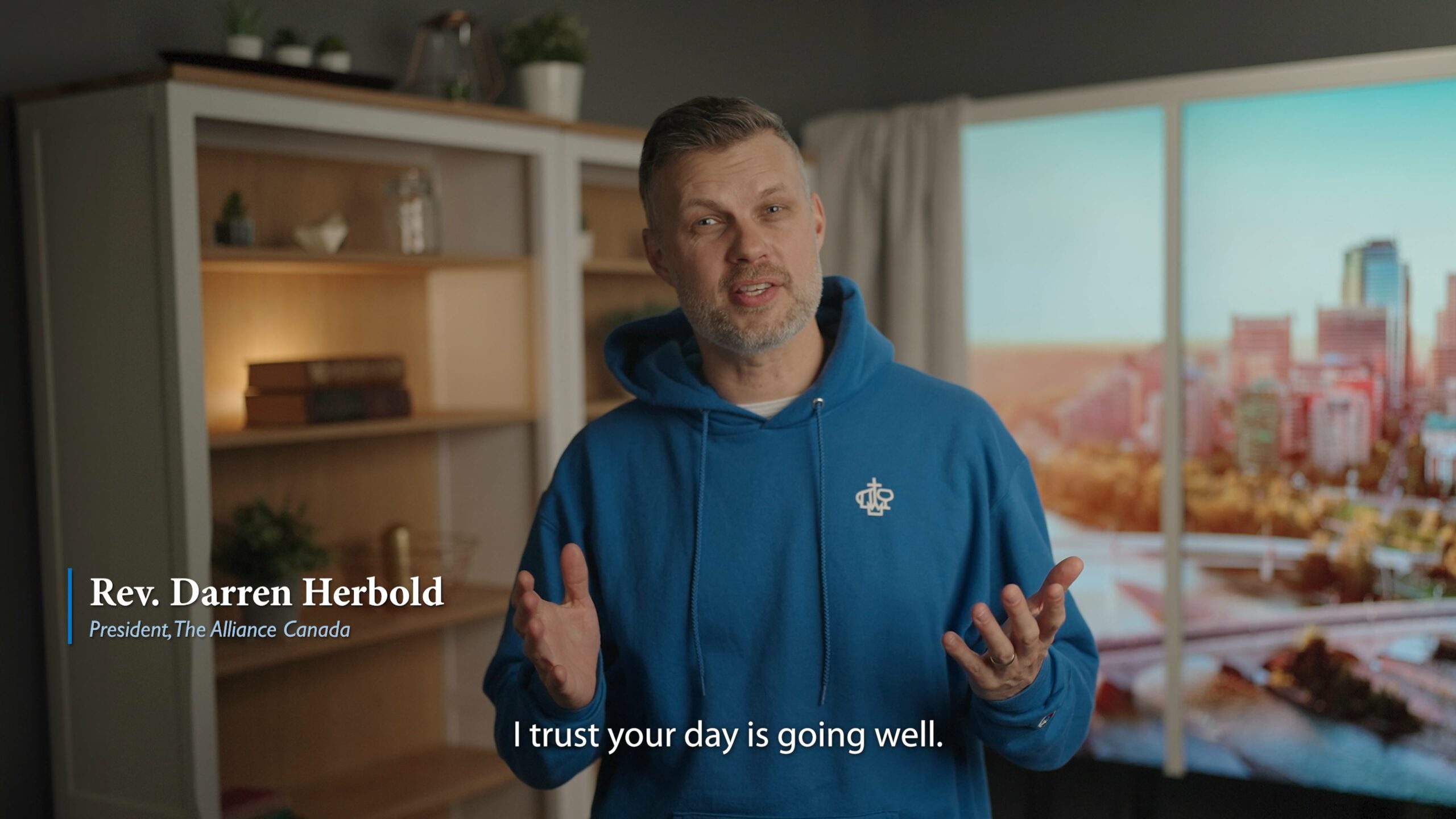Along the journey called life, there are a plethora of challenges and opportunities that come our way. Whether presenting to us in forms of intrigue, demand, necessity, or the ordinary, we can experience challenge and opportunity every day through various conduits.
Perhaps the most meaningful conduit is relationship. When journeyed long enough, deep enough, or even briefly, relationships in all forms provide us with potential opportunities to be embraced or lost. Chances to face these relationships as conduits of Christ’s love are occasions to be one with His Spirit and part of His plan of reconciliation. Each of us faces countless opportunities every week at home and in our communities. If we listen to ourselves, to the Spirit, and to others, follow through with faith and love while trusting in the redemptive work of Christ, we will be agents of reconciliation. If there is a need for reconciliation, then clearly, there is conflict!
“All this is from God, who reconciled us to himself through Christ and gave us the ministry of reconciliation: that God was reconciling the world to himself in Christ, not counting people’s sins against them. And he has committed to us the message of reconciliation. We are therefore Christ’s ambassadors, as though God were making his appeal through us. We implore you on Christ’s behalf: Be reconciled to God. God made him who had no sin to be sin for us, so that in him we might become the righteousness of God” (2 Corinthians 5:18-21).
There are many books and tools to study and use for conflict management, but this book and consequently this chapter is one of preparation. Preparation is looking ahead and making ready. As ways to grow and prepare for conflict, we will consider four primary learning areas and three attitudes or postures, followed by a brief look at ways to engage when we encounter it. The learning areas are 1) self-knowledge, 2) knowledge of self through Christ, 3) knowledge of self in relation to others, and 4) self with others as the body – a community under Christ as Head.
The attitudes required for gracious, productive conflict, which produces good fruit in us, others, and the community, include humility, faith, and love. I have not forgotten forgiveness. Forgiveness will be the practice of one who applies humility with Christ and others, lives in faith in Christ’s work in self and others, and has heartfelt love for Christ and others. Forgiveness is essential in relationships and flows out of a heart acknowledging and resting in the redeeming love of Christ. One who has a deep understanding of their own desperate need and experience of the forgiveness of Christ will have the generosity of heart to forgive others.
Conflict is not a beloved word and is often an avoided circumstance, yet it is as old as Adam and Eve. It is old as dirt, so to speak. Although God created the earth and mankind, and it was good, conflict entered the world in those early days―Eve and the serpent, Adam and Eve, Adam and Eve in conflict with their Creator, and conflict in some sense with creation because of their sin.
Don’t get me wrong, not all conflict is sin; however, it can certainly be a catapult to sin if we allow the conflicts to be platforms of idolatry in our lives. Had Eve’s response to the serpent been different, she might have faced conflict with humility and acceptance of her place and limitations in the garden, trusting the loving boundaries her Creator gave her. If Adam had loved God more than Eve, would he have faced the conflicting decision of his heart with faith, obedience, contentment, and gentle confrontation of his wife? Had they faced the situation with the knowledge of God and submission to Christ through the power of the Spirit, conflict would not necessarily have been avoided but quieted and resolved.
We all know this story of conflict was full-blown, and all of us have been sinning ever since. We needed Christ to face the ultimate conflict for us. God had His plans from the beginning to rescue us from sin and the darkness of our hearts brought on by the devil, the flesh, and the world. Christ Himself became sin for us and fought for us. He continues to fight for us. If Christ is for us, who can be against us?
So, we who are in Christ have a responsibility to Him and to one another, but also to the world. Genesis 1:27 says all of mankind was created in the image of God.
Although I have identified four learning areas and three postures for preparing for loving productive conflict engagement, it is impossible to entirely separate these areas and attitudes even in my writing. They are intertwined and woven together just as we are woven by our Creator for community. Now, let us look at the extent, responsibility, and privilege of being image-bearers of God and co-heirs with Christ.
Self-Knowledge
In some sense, we may know ourselves quite well, yet we are all on a journey of understanding why we do what we do, how we impact others by what we do, and why and how others affect us. We are complex beings with deep longings only God can fill. Our thinking gets twisted as the person we think we are, or perhaps who we want to be, is not nearly always the person others see.
Everyone has internal conflict; we are conflicted in our own hearts at times. Praise God we have been rescued from sin and set free by the Spirit who is at work within us. One who has good self-knowledge is aware of their weaknesses and strengths, remembers their failures, sins, and faults, and the growth, development, and progress. They can notice when emotions are rising and explore what triggers them and what needs to be resolved. They may learn how to manage their feelings and responses to others, not projecting their own history or pain onto the person who may be near their trigger point. They can separate their own experience from the experience of others and listen without assumption or presumption.
A person with healthy self-knowledge can celebrate another person’s accomplishment without jealousy or shoulder another’s pain or need without reciprocation. The one who has healthy self-knowledge will have the ability to care for self, set boundaries, and regulate their interactions with others because they understand how they impact others. Additionally, good self-knowledge and growth also include the skill of checking in on how one might be impacting another.
If you want to grow in self-knowledge, enter relationships with others with whom you give permission to tell you your strengths and weaknesses. Find someone willing to ask you hard questions and speak the truth to you in love. Take a course such as the Sharpening Your Interpersonal Skills workshop. Look into your Birkman Assessment and talk it through with others. Explore and identify your key values. So often, conflicts hit us hard when we feel our values are ignored or threatened. The most effective way to grow in self-knowledge is through the reflection we see of ourselves when we submit our spirits to God’s Spirit through the study of His Word. This is where we learn about ourselves through Christ.
Knowledge of Self through Christ
Developing self-knowledge through the light and lens of Christ is the greatest way to grow in the knowledge of God, yourself, and understanding of others. As the Spirit of God reveals Himself to us through His Word, we also see ourselves more clearly. Here again, it is helpful to have trusted spiritual friends who can help us interpret and apply God’s Word in our situations and hearts. An accountability partner or a spiritual director can help us with our blind spots, calling us into obedience and reminding us of what only God can do, reminding us of our humanity and God’s deity.
“There is no one righteous, no not one. We have all sinned and fallen short of the glory of God. I am a sinner not worthy of Christ. I am not righteous on my own. I am in deep need of a Saviour” (Romans 3:9- 11, 22-23).
It is imperative for us to know and accept we are sinners and we are forgiven by Christ; it is foundational for us to know we are chosen by God, made holy by Christ, and dearly loved by our Heavenly Father. Because we are His and we are profoundly and utterly loved, we have the capacity to exude those beautiful gifts of compassion, kindness, humility, gentleness, and patience. Those are precisely the beautiful gifts we have received from Christ. It is what we have been given; receive them, friends, and then give them away (Colossians 3:12)!
These gifts were not cheap. They were generously but not easily given. The gift of sweet, free, joy-filled life without guilt was purchased through great planning, extreme suffering, shed blood, and even Christ being forsaken by His Heavenly Father, whom He had always been with, to die for sinners like us. God’s great and painful redemptive work is for everyone. How we relate to everyone in conflict situations is a challenge and an opportunity to trust Him and join in extending the loving gifts He so wonderfully gave to us.
Knowledge of Self in Relation to Others
The love and sacrifice of Christ removed barriers for me and all my brothers and sisters. As a result, we have much in common with one another. All were sinners, and while we were still sinners, Christ died for us.
The Scriptures often reference believers as a whole—us, we, our. Many passages refer to the Church, the Body of Christ, believers, or brothers and sisters. The New Testament clearly presents the message of Christ being for us! God’s plan for expanding His community involves us as the community. If you want to serve overseas and work alone, please stay home! Of the places I have lived and visited across many countries in Asia, I can tell you community is of high value in these countries. They are watching to see how we do community among them, but also among ourselves. If you want to impact communities, you need to be a community champion.
Self with Others as the Body: A Community under Christ as Head
One of the problems is we are often more for and about ourselves than Christ or others. We get into a difficult situation and want to defend, fight, deny, or avoid the nasty realities or people. We compare our strengths against another’s weaknesses. We forget we are sinners in need of a Saviour. Before we were co-heirs, we were co-sinners. We need the skills of warriors, but not warriors of human armies; we need the skills of those who have been trained by Christ and are reliant upon His Spirit. These skills come from knowing the surpassing greatness of Christ in contrast to the limitless smallness of ourselves, yet with the miraculous invitation to be His chosen cleansed children, even His brothers and sisters!
We have been purchased by His costly blood, shed on the cross. We are bought, friends. Let it sink in for a bit. If we are purchased, we were slaves; if we are now brothers and sisters, we are now co-heirs with Christ, the only Son of the Most High God. Selah. We need to pause here and sit in this truth more often than we naturally do. I italicized “we” for a reason I will expound upon later. For now, suffice to say we together are the Body of Christ, given His Spirit to work together as representatives of Christ who is our Head, so the world may see He is God.
We have looked at learning about ourselves, ourselves through Christ, and relating to others. These all intersect because God made us for community with Him and one another. He also created us to be a collective witness to the world. There are many benefits to learning how to live in community with Christ, and one another, in which we can experience the joy and beauty of fellowship, but there are additional purposes at work in this plan of God. He invites us into fellowship with Him and one another and into joining Him in the expanded invitation to others who do not yet know Him. We are most effective in witnessing when we live as one, in community with Christ and one another. None of these truths are new to us, yet we can miss them. My hope and my prayer are as you read this chapter and the truths resonate with your spirit, you will be touched by the Holy Spirit and empowered to live these practices out more and more for the glory of God and the part we share in witness to the world.
In the New Testament, 1 Corinthians 12-14 describes how we are the Body of Christ, all essential parts with various necessary functions, and how we need each other. We rejoice as a whole, we suffer as a whole, and we work together as a whole under one Head, who is Christ Jesus. He has given each one of us gifts according to His purposes and shown us the way in which to work. “And now these three remain: faith, hope and love. But the greatest of these is love” (1 Corinthians 13:13).
It is worth your time to study the New Testament on the “one another” passages. It is significant how Christ prayed for us to be one.
“…that all of them may be one, Father, just as you are in me and I am in you. May they also be in us so that the world may believe that you have sent me. I have given them the glory that you gave me, that they may be one as we are one—I in them and you in me—so that they may be brought to complete unity. Then the world will know that you sent me and have loved them even as you have loved me” (John 17:21-23).
Attitudes/Postures: Humility, Faith, and Love
The attitudes and postures of our hearts are where good character can be developed, seen, and helpful in communities working through conflict. Humility is embodied by Christ Himself. As we read through the gospels, the epistles, and even the prophets who foretold His coming, humility is clearly seen in who Christ is and how He walked on earth. Christ is our Head and our example.
A contemplative study of Philippians 2 is an excellent place to understand how to live in humility. Ephesians 5:21 tells us to “Submit to one another out of reverence to Christ.” James implores us to humble ourselves. Micah instructs us to walk humbly.
We each have a responsibility to God for our own actions, and we are invited into carrying one another’s burdens. Galatians 6 gives us careful instruction in how to do this. It involves personal responsibility, humility, faith, and love. Everything we do grows out of our faith in believing who God is, who He says we are, and what we believe He can accomplish in and through us by moving in love and humility (Galatians 6:1-6).
“The only thing that counts is faith expressing itself through love” (Galatians 5:6). If we understand God’s love, what He has done for us, and believe, full of the fruit of the Spirit, we can express love through faith. Believe God will help us when we pray, listen, and ask for wisdom. He prayed for us to love one another. This is His will! Ask Him for it and believe He will do it.
Love has already been mentioned and must be continually emphasized. If we get nothing else, let us grow in understanding the enormity of God’s love for us and be generous in loving others. As Paul said in 1 Corinthians 13, “…the greatest of these is love.” Love is the amazing bit that lasts. We can have lasting fruit and an inheritance to pass on, and it only increases with use! Is there any other gift that increases with use? Well, maybe generosity, but actually, love and generosity are very similar. We all know you cannot give what you do not possess. Oh, dear ones, do not miss out on love, on knowing you are loved by God; you are the beloved! Study it, believe it, and agree with others in prayer for this to be your identity in Christ. The book of Ephesians is rich in confirming our identity in Christ (Ephesians 2:4-5).
Once we live into our identity in Christ as His beloved, we can live into His commands to love Him and others (Mark 12:30-31).
Now since we have looked at areas of learning as preparation for conflict and postures to practice in conflict, let’s consider a few things which may help when we encounter it.
Seen and Unseen
There are knowns and unknowns. We are all unique in our felt needs, histories, memories, experiences, wounds, and habits. Everyone has belief systems that impact how we interact with God, others, and the world, often unconsciously formed through our experiences and coping mechanisms. If we have learned to process why we do what we do and learned to work through the deep wounds of our souls with Christ, we may be better equipped to acknowledge when we are reacting to others from an unresolved experience. Understanding our shortcomings and capabilities of misunderstanding others enables us to be more open to engaging in conflict in productive ways. Although I said “learned,” we need to be continually learning.
There is the “you” you see and know, and there is the “you” others see or do not see and know, do not know, or think they know. The reverse is also true. Our actions and behaviours are seen; our feelings and intentions are unseen. Each of us is responsible for working out the unseen with Christ through the work of His Spirit within us. We may choose to share those inner workings with trusted friends and spiritual mentors. At times, it is also important to share fears or struggles with a colleague when a pattern or personal history and/or felt need is impacting a relationship.
Common Ground
When facing conflict, it may be helpful to put the issues aside for a time and find common ground. Every person has values. Although values differ among individuals, there are often common threads and shared values. When individuals are invited to share seven to ten values and give examples of what they look like in life, it humanizes the person and shows the heart, needs, and vulnerabilities of a person. After these values are shared, there will be obvious differences among those in conflict. Still, there will also be some areas of common value because we all are created in God’s image and desire to love, be loved, accepted, forgiven, and understood. In addition to sharing personal values, we can talk about shared goals and outcomes. What goals are we all working towards, or what outcomes do each of us want?
Communication
Listen, listen, and listen. Listen for the literal words. Listen to understand. Listen, so you might build the other up. What do the actual words communicate? Do not assume but ask by repeating what you hear or asking for clarification. These comments may begin with, “I want to understand you. Is this what you are saying? This is what I hear you saying…. This seems important to you. Will you help me understand?”
The language we use is important and impacting. Consider learning how to communicate with open questions and personal accountability language such as: “When this happened… it was difficult for me… when you said this…. I felt…
It was difficult for me when…. because I felt….”
Making judgments is something we do without thinking. Some of those judgments help us survive, such as judging the speed and distance of a passing vehicle. Other judgments are not helpful or healthy. Consider noticing times when you judge or draw conclusions based on appearance or a few spoken words. Then, practice suspending those judgments and work at learning about the person or circumstance.
What is Your Usual Conflict Style?
The conflict styles1 are accommodating, avoiding, compromising, collaborating, or competing.
It is valuable to understand your preferred conflict style while recognizing others may have different preferred styles. It is also helpful to recognize how the specific styles may be most beneficial in a corresponding situation. Depending on the relationship and dynamics of the conflict, particular styles can have better outcomes.
If a conflict arose where a violent person was running into my apartment, I would likely choose to avoid confrontation. However, if the building were on fire, and we had a family separated in rooms, I would value the conflict style of competing or commanding instruction of a professional to lead the rescue. When there are long-term relationships in conflict, shared values and goals with time for focus, a collaborating approach can produce effective, sustainable direction. In the situation of one person having much to lose in an area of high need, I might accommodate for their situation, denying my own comforts. This may seem like the choice of weakness, and sometimes it is, but sometimes it is the best choice.
Did Christ not accommodate for us in our plight of sin? We had no way to save ourselves. In confronting the devil, death, and sin, His style was competing; He took charge and was victorious. He was collaborating with the Father and the Spirit. God the Father sent His Son as a sacrifice for us; Christ listened to His Father and did only what the Father instructed Him to do. When He experienced temptation in the desert, He combatted conflict with the Word of God, and the Spirit attended Him. In the Garden of Gethsemane, when He was personally conflicted in anticipation of His death, He submitted to the Father out of obedience, though the inner conflict was painful. At times He avoided the argumentative crowds who wanted to destroy Him.
Mediation
Christ is the perfect Mediator. He has reconciled us to God and has given us the ministry of reconciliation. As we enter the ministry of reconciliation, whether for bringing a seeker into the knowledge of Christ’s invitation for eternal life or working through complex issues with fellow believers, let us allow Christ through His Spirit to lead us.
Listening to individuals separately can be a very important first step as a mediator. The individual needs to be heard, understood, and acknowledged for their value as a person who is given the opportunity to present their experience. A mediator can also help them unpack and process their experience in the conflict by looking at the seen and unseen workings of the conflict. As the seen and unseen workings are unpacked, it can give perspective on themselves and the other party in the conflict.
With intentions, meaning well is not always enough. Do we always even know what our intentions are? Did we even consider intentions at all? When one of our sons was just five years old, he often said, “but I didn’t mean to do it.” These occasions became learning opportunities for him to develop how to “mean to do something else.” We need to learn to be intentional in relationships. All too often, we can slip into autopilot and be quite unintentional, leading to disaster in crisis situations. As God’s people, chosen, holy, and dearly loved, we are called to be intentionally loving people to Christ and to the world. I believe as we grow in knowing Christ and inviting Him to work in us and intentionally live by humility, faith, and love, the challenges of conflict we face will be opportunities for the conduits of Christ’s loving invitation into the community of the Trinity and the Church.
This is an excerpt from the book, On Mission Volume 4. Download your free copy today.
Share:
Find more posts about:
The Alliance Canada
Support the mission
The Global Advance Fund (GAF) is a pooled fund that supports our workers in Canada and around the world to share the Gospel with people who haven't yet heard the name of Jesus. Your continued generosity equips and sustains our workers and their ministry.








